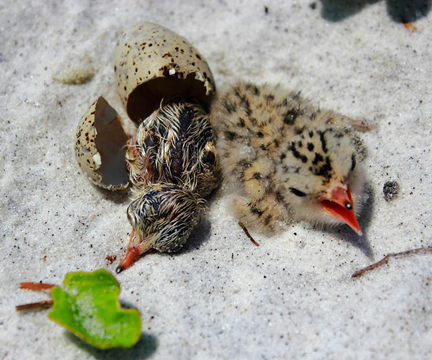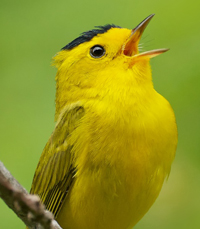For “Winged Wednesday”:
Saltmarsh Sparrow


“You wouldn’t think that a little brown sparrow and a huge white polar bear had anything in common—but both species are in danger of disappearing because of climate change. Because the Saltmarsh Sparrow depends exclusively on saltmarsh, it could disappear, along with the habitat, if sea levels continue to rise.
Aside from sea level rise, the Saltmarsh Sparrow is threatened by development and diking of its habitat; habitat degradation from chemical spills and other pollutants; and invasive species (particularly Phragmites, an introduced reed which makes the bird’s habitat completely unsuitable).
 One important conservation measure for this species would be to identify and protect large areas of saltmarsh along the Atlantic Coast, especially where this habitat could move inland should the climate change. The Saltmarsh Sparrow does occur within a number of protected areas supporting coastal habitat, and restoration of tidal marshes is ongoing.”
One important conservation measure for this species would be to identify and protect large areas of saltmarsh along the Atlantic Coast, especially where this habitat could move inland should the climate change. The Saltmarsh Sparrow does occur within a number of protected areas supporting coastal habitat, and restoration of tidal marshes is ongoing.”
Photo by George Jett; Range Map by NatureServe
“You can help the Saltmarsh Sparrow by joining our Spring 2013 Fundraising Challenge. We urgently need your support to conserve coastal marshes and other critical bird habitats.”
![]() Can't click the link? Copy and paste this URL: https://www.abcbirds.org/membership/donate.cfm
Can't click the link? Copy and paste this URL: https://www.abcbirds.org/membership/donate.cfm
_______
Help imperiled bird species survive along our beaches
Two newly hatched least tern chicks. Photo Jeff Talbert
“In order to help us protect these birds we simply ask that you keep your dogs on a leash and do not cross any rope barriers that are established to protect colonies. You will immediately know when you have ventured into an area that you shouldn’t by the sight of nearly 300 birds swirling about and diving at you. There has been a large time investment by park staff ensuring the success of this year nesters and we need your help for that success to continue. These simple steps will help as you are enjoying our beautiful beaches.
- KEEP YOUR DISTANCE- If birds become agitated and leave their nests then you are too close, this also leaves their eggs and chicks vulnerable to predators and the summer heat.
- RESPECT POSTED AREAS- Nests are camouflaged and blend in with the sand thus making them hard to see. Walking or allowing your dog to roam in roped off areas puts nest at risk of being trampled. This also applies to the air over roped off areas, shooting fireworks, flying remote controlled planes, or flying a parasail over protected areas creates a disturbance and will chase birds away.
- NEVER INTENTIONALLY FORCE BIRDS TO FLY- Birds come to our beaches to rest just like we do. When we scatter a group of birds they have to use energy that they need to reserve for nesting activities or migration. While it creates a great visual it is the same as someone chasing you as soon as you sit down on the beach.
- KEEP PETS ON A LEASH AND AWAY FROM NESTING AREAS- While it is probably true that your particular dog doesn’t chase birds, nesting shorebirds can’t distinguish a good dog from a predatory dog they just assume all canines are predatory and react as such. Two of their main predators are canines, such as coyotes and fox. They will flush off of their nest when approached by anything resembling a threat putting eggs and chicks at risk; this includes your dog no matter how well behaved. In Walton county dogs are allowed on the beach at certain times with a proper permit. They are not allowed at anytime to be off a leash or on the state park beaches.
- KEEP THE BEACH CLEAN AND DO NOT FEED WILDLIFE- Food scraps attract predators such as raccoons and fish crows to the beaches. Fishing line and other litter poses a threat to flightless chicks. It is against the rules to feed wildlife in the state park not to mention it is impolite to your beach neighbors to attract seagulls with snacks. They will eat anything and don’t know when to go away.
- SPREAD THE WORD- If you see people disturbing the nesting birds please let them know how they may be affecting bird’s survival or contact the Grayton Beach State Park office at 850-267-8300, the Walton County Sheriffs Office at 850-892-8111, or FWC at 888-404-3922.
Please help us give these birds a chance at survival.” More at: http://www.waltonoutdoors.com/help-imperiled-bird-species-survive-along-our-beaches/
_______
“Wilson's Warblers are a common sight across much of North America, as they move to and from their breeding grounds in Alaska, Canada, and the Pacific Northwest.
But do you know who Wilson was? And how many other birds are named after him?” Find out here >>
________
BirdNote Weekly Preview: Redtails, Towhees, and Jazz ...
Upcoming Shows:
Red-tailed Hawk
SUNDAY Soaring with Redtails by Bob Sundstrom LISTEN NOW ►
Prothonotary Warbler
MONDAY The Big Thicket -America's Ark by Bob Sundstrom Featuring recordings by Gordon Hempton LISTEN NOW ►
Eastern Towhee
TUESDAY Towhees' Distractive Plumage by Frances Wood LISTEN NOW ►
Palouse country, Washington State
WEDNESDAY Palouse Country by Dennis Paulson LISTEN NOW ►
Gentoo Penguin
THURSDAY Jazz for the Birds by John Kessler LISTEN NOW ►
Red-naped Sapsucker
FRIDAY Trust and Partnerships Help Birds in Montana With Jim Brown of Five Valleys Audubon LISTEN NOW ►
Common Murre
SATURDAY Murres' Swimming Migration featuring Bob Boekelheide LISTEN NOW ►
_______
On This Day:
The Battle of Britain begins, Jul 10, 1940:
“On this day in 1940, the Germans begin the first in a long series of bombing raids against Great Britain, as the Battle of Britain, which will last three and a half months, begins.
After the occupation of France by Germany, Britain knew it was only a matter of time before the Axis power turned its sights across the Channel. And on July 10, 120 German bombers and fighters struck a British shipping convoy in that very Channel, while 70 more bombers attacked dockyard installations in South Wales. Although Britain had far fewer fighters than the Germans–600 to 1,300–it had a few advantages, such as an effective radar system, which made the prospects of a German sneak attack unlikely. Britain also produced superior quality aircraft. Its Spitfires could turn tighter than Germany's ME109s, enabling it to better elude pursuers; and its Hurricanes could carry 40mm cannon, and would shoot down, with its American Browning machine guns, over 1,500 Luftwaffe aircraft. The German single-engine fighters had a limited flight radius, and its bombers lacked the bomb-load capacity necessary to unleash permanent devastation on their targets. Britain also had the advantage of unified focus, while German infighting caused missteps in timing; they also suffered from poor intelligence.
But in the opening days of battle, Britain was in immediate need of two things: a collective stiff upper lip–and aluminum. A plea was made by the government to turn in all available aluminum to the Ministry of Aircraft Production. "We will turn your pots and pans into Spitfires and Hurricanes," the ministry declared. And they did.”
--------
From me: When I was raised in London during the war, I remember when the call went out for everyone to donate any metal that they had. In our area, all the houses had ornate chains between the sidewalks and the front yards, and they were all turned in.
_______
Yesterday:
Ray came over and pressure washed the new board fence by the front door. I was busy getting things out of the way of the water. Some strange marks had appeared on the white vinyl siding by my front door. Ray tried to pressure wash them away, and I tried a magic sponge and some Comet, but they still show. Finally, I deduced that they had been made by the sun reflecting on the car windows onto the siding, and it has burned the siding. There is a chair on the front porch and you can see the outline on the siding. Another casualty of my RVport/carport being torn down. The first one is that even with windows open a bit under the side shade/rain vents, my van windshield has cracked from the heat. Now that will have to be replaced before it’s next inspection.
While we were doing that, a tech from my ISP called to try to fix my computer. He had access to my computer, looked at a lot of things, and then installed a different program.
By then it was past lunch time. My back was hurting more than usual. After two visits, the new chiropractor still hadn’t put my back in. After lunch I laid down for a bit, but it still hurt. I called one of the old chiropractors I used to see, he told me to come right in, and he adjusted it.
My back was hurting so much that I did something that I never do, go to another town in the afternoon in the summertime. I was almost sorry that I had gone in the afternoon, it was so hot and there was a severe tie up on the freeway. I could see my temperature gauge climbing. That was scary, I didn’t want to have to pull over off the freeway and get stuck in the blazing sun, but the van made it without the gauge going into the danger zone.
After my back being out for such a long time, it was still hurting when I got home, so I didn’t know if the chiropractor had fixed it.
When I tried to answer some emails, I found out that there is a glitch in that new program where you can’t see the original email before you forward it, just the recipient can. There are times when one has to clean up any previous addresses to prevent spam, and other stuff, so that wasn’t going to work for me. Two techs later and I am now using a different program. I hope this one is OK, as I am so tired of talking to techs.
My back was so sore all I wanted was to be horizontal. I fed the animals, took some Aleve, and went to bed at 7.00pm. I didn’t fall sleep right away, but at least it felt better when I was lying down. Now, this morning, my back doesn’t hurt, he must have fixed it yesterday.

























3 comments:
Good to hear you back feels better Penny. There is nothing worse then that and you are such a doer that it must really be such a problem for you.
Take Care and try and stay cool.
We are so wet in Alberta it is crazy this summer.
Brenda
Glad they got you fixed up. My wife went to one and he broke two of her ribs where they attach to the back-bone. That took months to heal and sometimes it still bothers her.
Thank you for your comments, Brenda and DD.
Sorry about all the rain on this trip back to Alberta, Brenda. But just think how beautifully green it will be. Here, the grass is dry, brown and crisp. Please send some, not a lot, of rain our way.
Sorry to hear about Ruth's ribs, DD. I had a chiropractor really hurt one of my ribs, and it took a long time to get better. Needless to say, even though he put my back in at the first try, I never went back to him.
Happy Tails and Trails, Penny
Post a Comment